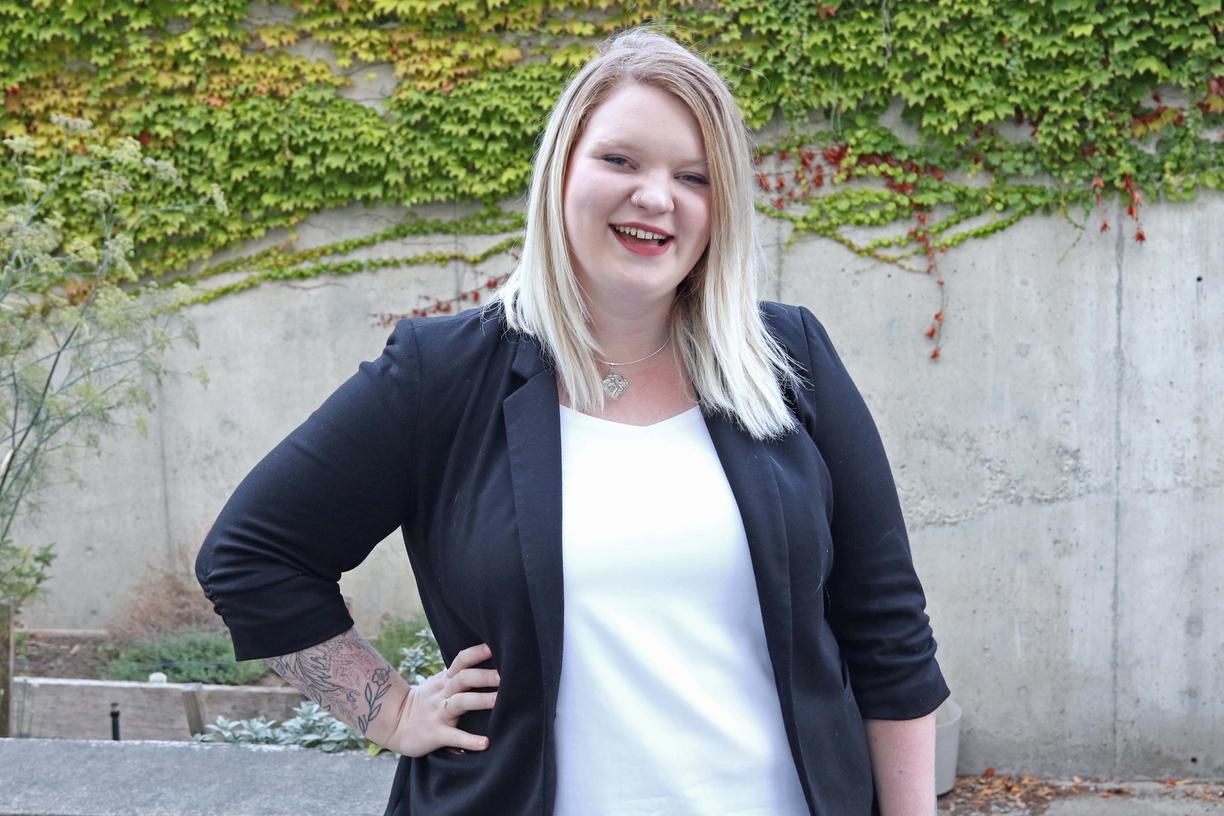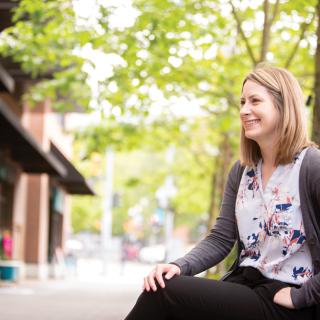VIU Child and Youth Care alum Ruby Barclay, who is now the Nanaimo Aboriginal Centre’s Youth Advisory Council Co-ordinator, speaks out about the value of post-secondary education.
After a year of planning, Ruby Barclay arrived at Vancouver Island University (VIU) Student Residences from her hometown with two Rubber Maid totes and a duffel bag.
“That was it – that was my entire life,” she remembers. “The first day was really, really tough.”
While most youth transitioning to post-secondary rely on parents and extended family for support with school, living expenses and advice, Barclay had just aged out of BC’s youth in care system. Unlike many of her peers, Barclay did not have a parent to make the journey with her, take her to Costco to get supplies, or help instill the confidence she needed to succeed in her studies.
“I had to figure out and plan all these things on my own,” she says. “Getting my acceptance letter from VIU is still one of the best days of my life. For me, it meant there was a chance to have a future beyond 19, and that someone believed I could do it. It was an opportunity to access education that I otherwise wouldn’t have access to – VIU was one of the only institutions waiving tuition fees for those with lived experience in the care system and that was the only reason I could consider attending post-secondary.”
Fast forward to today, and Barclay, who finished the requirements for her Child and Youth Care degree last spring, has found work she’s passionate about – supporting others who have experienced the government care system as Youth Advisory Council Co-ordinator with the Nanaimo Aboriginal Centre.
A new report commissioned by VIU analyzing the economic impact and return on investment of education at the University found that VIU contributed to the socio-economic well-being of the local and provincial community by $23.1 million due to the benefits of post-secondary education. Students earn more because of the skills and qualifications they acquire at VIU, are less likely to require income assistance or commit crimes for this reason, and are statistically more likely to develop good health habits, states the report.

While at VIU, Barclay discovered, partly through her own experiences, that although the University paid tuition expenses for anyone who has spent time in the care system, there were no supports built in to meet the unique needs of these students and ensure they were successful once they got here. She developed a practicum placement that later turned into a paid position at VIU – Peer Support Navigator for the Post-Care Tuition Waiver Program.
“As the first institution in BC to adopt such a program, VIU had to learn our role in supporting former youth in care to succeed,” explains William Litchfield, Associate Vice-President of University Relations. “Despite still being a student, Ruby’s role was largely about teaching us how to best support students, and creating a sense of community and connectiveness between VIU and tuition waiver students.”
One student Barclay supported was living in a tent and didn’t know who to turn to for help. She helped the student get funding for living expenses and drove them to the store to pick up basic supplies.
“We were shopping for five hours while I supported them in believing that it was okay to purchase items like soap, bed sheets and shoes without holes in them – luxuries they had grown up without,” remembers Barclay. “They wouldn’t have been successful in their studies if they hadn’t had their basic needs met, and a support to help them identify what those needs might be. I was lucky in that I had developed the skills I needed to do things like navigate the bus system so I could go buy groceries – many lack these skills because of their experiences in care. And with minimal support past 19, youth aging out of care are much more likely to experience homelessness, end up on welfare or incarcerated.”
Barclay says what her education has done for her is ensure she breaks the cycle of poverty for her own family and future generations. But that’s not the only thing post-secondary did for her – it also helped her find her family.
“The biggest benefit of going to VIU, aside from education, was the community,” she says. “I didn’t grow up believing that I could be more than someone with lived experience in care until I found a community that believed I could.”
-30-
Media Contact
Jenn McGarrigle, Communications Officer, Vancouver Island University
P: 250.740.6559 | C: 250.619.6860 | E: Jenn.McGarrigle@viu.ca | T: @VIUNews


